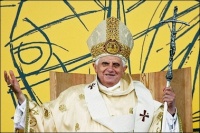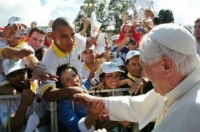- Apostolic Journey to Brazil on the occasion of the Fifth General Conference of the Latin American and Caribbean Bishops' Conferences (May 9-14, 2007) - Official Program, Intinerary and Addresses from the Vatican.
Addresses by Pope Benedict XVI

- Welcome ceremony at the International Airport of São Paulo/Guarulhos - Address. May 9, 2007.
- Greeting and blessing from the balcony of the Monastery of São Bento in São Paulo. May 9, 2007.
- Meeting with the youth at "Paulo Machado de Carvalho" municipal Stadium in Pacaembu, São Paulo - Address May 10, 2007.
- Holy Mass and canonization of Blessed Frei Galvão at Campo de Marte in São Paulo - Homily May 11, 2007.
- Meeting and Celebration of Vespers with the Bishops of Brazil in the Catedral da Sé in São Paulo - Address May 11, 2007.
- Meeting with the community of Poor Clares at the church of the Fazenda da Esperança in Guaratinguetá - Greeting May 12, 2007.
- Meeting with the community living in the Fazenda da Esperança in Guaratinguetá - Address May 12, 2007.
- Recitation of the Holy Rosary and meeting with Priests, Men Religious, Women Religious, Seminarians and Deacons at the Basilica of the Shrine of Aparecida - Address May 12, 2007.
- Holy Mass for the inauguration of the Fifth General Conference of the Bishops of Latin America and the Caribbean in the square in front of the Shrine of Aparecida - Homily May 13, 2007.
- Recitation of the Regina Cæli
- Inaugural session of the Fifth General Conference of the Bishops of Latin America and the Caribbean at the Conference Hall of the Shrine of Aparecida - Address May 13, 2007.
- Farewell ceremony at the International Airport of São Paulo/Guarulhos - Address
- Brazil Welcomes a Very Different Pope, by Jeff Israely. Time May 12, 2007.
- Photo Gallery: Pope Benedict Visits Brazil Time
- No Love Affair for the Pope in Brazil, by Jeff Israely. May 12, 2007 -
- Day Five: Christ, not ideology, creates a ‘continent of hope,’ pope says May 13, 2007.
- Day Four: Facing dramatic losses, Benedict says: ‘It’s worth it to stay Catholic!’ May 12, 2007.
- Day Four: Benedict issues dramatic warning to drug dealers, but his real message is Christ May 12, 2007.
- Day Three: Pope calls Brazil's bishops to order May 11, 2007.
- Day Three: Benedict holds up a model of authentic liberation theology May 11, 2007.
- Day Two: Benedict strikes softer tone May 10, 2007.
- Day Two: Hopelessness, not Pentecostalism, as Brazil's mega-trend in religion May 10, 2007.
- Day One: Confusion on communion for pro-choice politicians nothing new May 9, 2007.
- Day One: The Love/Hate Relationship between Benedict and Liberation Theology May 9, 2007.
- Day One: Transcript of News Conference aboard the Papal Plane May 9, 2007.
- Day One: Benedict’s ‘now-you-see-it, now-you-don’t’ hard line on pro-choice politicians May 9, 2007.

- Amid Burst of Fervor, Pope Canonizes a Brazilian New York Times May 12, 2007:
“We Brazilians love to venerate the saints, like St. Anthony and St. George, but until now they’ve all been foreigners,” said Bernardo Leite Alves, a 39-year-old bus driver who said he often drove with an image of St. Sebastian on his windshield. As for Friar Galvão, he said, “This is a saint who is really truly ours, born and bred here, who looks like us and has a name like ours.”
Friar Galvão was born in 1739 about 100 miles northeast of here, in Guaratinguetá, which Benedict will visit Saturday, and died here 83 years later. During his lifetime, the city council designated him a “man of peace and charity,” and he earned a reputation for defending the poor, which stimulated popular pilgrimages to his tomb and the use of “Friar Galvão’s pills,” slips of paper with religious phrases that are said by his devotees to have healing powers.
Among the three miracles for which he is credited is the 1999 birth of a boy to a woman who had suffered three miscarriages and then used such “pills” after becoming pregnant again and praying for his help. The woman, Sandra Grossi de Almeida, attended the canonization Mass.
“The significance of Friar Galvão’s example lies in his willingness to be of service to the people whenever he was asked,” Benedict said Friday. “He was renowned as a counselor, he was a bringer of peace to souls and families and a dispenser of charity, especially toward the poor and the sick. He was greatly sought out as a confessor, because he was zealous, wise and prudent.”
- Pope Canonizes First Brazilian Saint, by Victor L. Simpson. APNews. May 11, 2007:
The canonization makes Galvao the first native-born saint from the world's largest Roman Catholic country, home to more than 120 million of the planet's 1.1 billion Catholics.
- "A New Saint" - Compilation of photo coverage of the canonization by Argent by the Tiber May 12, 2007.
"Do you realize how big this is?" asked Herminia Fernandes, who joined the multitude that jammed an airfield for the open-air Mass. "It's huge, this pope is visiting Brazil for the first time and at the same time he is giving us a saint. It's a blessing."
- "A New Saint" - Compilation of photo coverage of the canonization by Argent by the Tiber May 12, 2007.
- Profile: Saint Antonio Galvao BBC News.
- Pope canonizes Brazilian friar renowned for charity, healings, by John Thavis. Catholic News Service. May 11, 2007.
- Vatican tones down papal remarks on pro-abortion Catholic politicians Catholic News Service. May 10, 2007:
SAO PAULO, Brazil (CNS) -- Pope Benedict XVI's comments on excommunication for pro-abortion Catholic politicians touched on huge and sensitive issues -- so sensitive that the Vatican issued a toned-down version of his remarks the following day.
Speaking with journalists on the plane taking him to Brazil May 9, the pope left the impression that he agreed with those invoking excommunication for Catholic legislators in Mexico City who had voted in April to legalize abortion.
When reporters pressed the pope on whether he supported the excommunication of the Mexican deputies, he answered: "Yes, this excommunication was not something arbitrary, but is foreseen by the Code (of Canon Law). It is simply part of church law that the killing of an innocent baby is incompatible with being in communion with the body of Christ."
Referring to Mexican bishops, the pope continued: "Therefore, they did not do anything new, surprising or arbitrary. They only underlined publicly what is foreseen in (canon) law, a law based on the church's doctrine and faith, on our appreciation for life and for human individuality from the first moment."
On May 10, the Vatican press office released the official transcript of the pope's 25-minute session with reporters. The pope's opening "yes" to the direct question about excommunication had disappeared, and so had the references to Mexican bishops.
- As Pope Heads to Brazil, Abortion Debate Heats Up, by Larry Rohter. New York Times May 9, 2007.
- Day One: Benedict’s ‘now-you-see-it, now-you-don’t’ hard line on pro-choice politicians May 9, 2007:
During a news conference aboard the papal plane from Rome to São Paulo today, Benedict XVI appeared to significantly tighten the screws on pro-choice Catholic politicians, saying, in effect, that legislators who support pro-abortion measures should be considered excommunicated under church law.
It was the first time a pope directly asserted that by virtue of voting in favor of a measure expanding abortion rights, a politician excommunicates him or herself.
Vatican efforts to soften this hard line, however, were quick in coming.
- Day Two: Mexican cardinal says pope repeated bishops' line on abortion, by John Allen, Jr. National Catholic Reporter May 10, 2007:
Cardinal Norberto Rivera Carrera of Mexico City, the place where recent debates over communion for pro-choice Catholic politicians formed the background to Benedict XVI’s Wednesday comments aboard the papal plane, said today that the pope “only repeated what we bishops already had said.”
- Confusion on communion for pro-choice politicians nothing new May 9, 2007
"Confusion created today on the papal plane – after Pope Benedict XVI appeared to say that politicians who vote in favor of abortion rights should be considered excommunicated, only to have Vatican officials back away from that interpretation – is nothing new. Attempts to discern the mind of Joseph Ratzinger on this question have long been complicated. . . .
Allen revisits the then-Cardinal's July 2004 letter to Cardinal McCarrick, Worthiness to Receive Holy Communion — General Principles, addressing the issues raised in party by the presence of professed 'pro-choice Catholic' candidates of the 2004 U.S. presidential elections. As Allen observes, "for the last three years, both sides in the communion controversy have cited Ratzinger in favor of diametrically opposed positions." Allen concludes:Carefully studying the various statements that are now on the record, perhaps the best summary of Benedict XVI’s position can be phrased as follows.
In the abstract, Benedict clearly seems to feel that a Catholic politician who knowingly and consistently supports legislation that expands access to abortion is in violation of church teaching, and thus should not receive communion. Moreover, the pope seems prepared to support bishops who apply this principle to specific cases; that was the premise of his answer to this morning’s question about the Mexican bishops. (Even though Cardinal Norberto Rivera has said he has no intention of excommunicating anyone.)
Whether Benedict is ready to impose this position on bishops convinced of the wisdom of a different pastoral course in other cases, however, is the $64,000 question. His July 9 letter to McCarrick, endorsing the stance of the U.S. bishops, indicates that at least so far, he’s not ready to take that step.
That may not be a fully satisfying position for anyone, but it seems the best summation of the pope’s thinking based on the available evidence.
- Must-Read: A primer for those who prefer knowing to opining, by Edward Peters. In the Light of the Law May 7, 2007:
In the vortex swirling around the pope's comments on the canonical consequences for supporting pro-abortion legislation (including what the pope said, or meant to say, or should have said), it might be good to set out calmly and simply some canons that directly impact on this situation. Strictly speaking, there are only two, but in light of comments I've heard or read, we apparently need to explicitate a third canon even though it only repeats sound personal moral theology and does not direct ecclesiastical responses to this kind of behavior. . . .
See also Ed Peter's critique of Time magazine's interview with Cardinal Oscar Rodriguez Maradiaga of Tegucigalpa, Honduras, and specifically the Cardinal's answers to questions concerning pro-abortion Catholic politicians. (Via Domenico Bettinelli). - Italian coverage of the Pope’s “excommunication” answer, by Fr. John Zuhlsdorf (What Does Prayer Really Say? May 10, 20007).

No comments:
Post a Comment